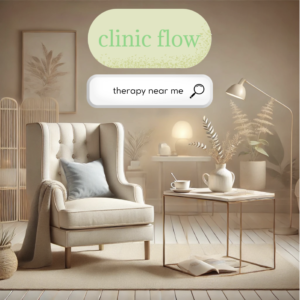In today’s digital age, having an effective website for therapy clinics is no longer optional—it’s essential. A well-designed website for therapy clinics can serve as your practice’s digital front door, welcoming potential clients and guiding them toward taking the first step in their mental health journey.
Key Elements of a Successful Website for Therapy Clinics
User Experience and Design Elements
Creating an welcoming digital environment includes:
– Clean, minimalist design that reduces anxiety
– Intuitive navigation structure
– Mobile-responsive layout
– Fast loading speeds (under 3 seconds)
– Accessible design features
– Calming color schemes
– Clear typography
– Strategic white space usage
Essential Content Pages and Structure
Your website should include:
– Homepage with clear value proposition
– About page highlighting therapist credentials
– Detailed services pages
– Insurance and payment information
– Contact page with multiple options
– Blog section for educational content
– FAQ page addressing common concerns
– Privacy policy and terms of service
SEO Optimization Strategies for Website for Therapy Clinics
Implement these SEO best practices:
Technical SEO:
– Proper heading hierarchy (H1-H6)
– XML sitemap implementation
– robots.txt configuration
– Schema markup for therapists
– Secure HTTPS protocol
– Core Web Vitals optimization
On-Page SEO:
– Keyword-rich meta titles and descriptions
– Alt text for all images
– Internal linking structure
– Location-based keywords
– Natural keyword placement
– Optimized URL structure
Content SEO:
– Regular blog updates
– Long-form service pages
– Location-specific content
– Expert mental health articles
– Client success stories (HIPAA-compliant)
– FAQs addressing search intent
Conversion Rate Optimization
Maximize client acquisition through:
Call-to-Action (CTA) Placement:
– Above-the-fold contact buttons
– Floating appointment scheduler
– Multiple contact points
– Clear value propositions
– Emergency contact information
– Insurance verification forms
Trust Signals:
– Professional certifications
– Association memberships
– HIPAA compliance badges
– Secure payment indicators
– Client testimonials (with permission)
– Awards and recognition
Content Marketing Strategy for Website for Therapy Clinics
Develop valuable content including:
– Educational blog posts
– Mental health resources
– Treatment approach explanations
– Self-help guides
– Newsletter signup options
– Downloadable worksheets
– Video content
– Podcast episodes
Technical Performance
Ensure optimal functionality with:
– Regular speed optimization
– Cross-browser compatibility
– Security measures
– Backup systems
– Form functionality
– Analytics tracking
– Heat mapping tools
– A/B testing capabilities
Best Practices for Implementation of Website for Therapy Clinics
When developing a website for therapy clinics, consider these important factors:
1. Privacy and Compliance
– HIPAA-compliant forms
– Secure data transmission
– Clear privacy policies
– Cookie consent
– Accessibility compliance
– Professional ethics adherence
2. Local SEO Integration
– Google Business Profile optimization
– Local keywords
– Area-specific content
– Directions and maps
– Local business citations
– Community involvement highlights
3. Content Creation Strategy
– Regular blog updates
– Expert articles
– Client resources
– Newsletter content
– Social proof elements
– Educational materials
## Advanced Features to Consider
1. Interactive Elements
– Online scheduling systems
– Insurance verification tools
– Secure client portals
– Virtual waiting rooms
– Resource libraries
– Assessment tools
2. Marketing Integration
– Email marketing connectivity
– Social media integration
– Review management
– Lead capture forms
– Analytics tracking
– Retargeting capabilities
## Conclusion
Creating an effective website for therapy clinics requires careful attention to both technical and human elements. Focus on building a platform that not only ranks well in search engines but also provides a comfortable, trustworthy environment for potential clients to learn about your services and take action.
Remember to regularly update your content, monitor performance metrics, and make adjustments based on user behavior and feedback. Your website should serve as a valuable resource for both current and potential clients while effectively representing your practice’s professional standards and values.
*Note: Always ensure your website complies with relevant healthcare regulations, privacy laws, and professional ethical guidelines.*
Transformative Applications of AI for Website for Therapy Clinics
The integration of AI for therapy clinics is revolutionizing how mental health practices operate, communicate, and serve their clients. From content creation to administrative tasks, artificial intelligence tools are helping clinics become more efficient while maintaining the human touch that’s essential in mental healthcare.
Understanding How AI for Therapy Clinics Can Transform Your Practice
Let’s explore how AI can enhance various aspects of your mental health practice while maintaining ethical standards and professional integrity.
Content Creation and Marketing
AI-powered content assistance:
– Blog post topic generation
– Social media content ideas
– Newsletter templates
– Educational resource creation
– Mental health awareness campaigns
Content Optimization Tips:
– Use AI to research trending mental health topics
– Generate content outlines
– Create varied content formats
– Maintain consistent posting schedules
– Ensure all content aligns with professional guidelines
Visual Design and Branding
AI design tools can help with:
– Logo variations
– Social media graphics
– Website imagery
– Infographic creation
– Branded templates
– Color palette selection
– Typography combinations
– Marketing materials
Best Practices:
– Maintain brand consistency
– Use appropriate mental health imagery
– Create calming visual elements
– Design accessible materials
– Ensure professional appearance
3. Administrative Efficiency
AI automation for:
– Appointment scheduling
– Reminder systems
– Insurance verification
– Basic client inquiries
– Document organization
– Billing processes
– Record keeping
– Task management
### 4. Client Experience Enhancement
AI-powered solutions for:
– Initial screening forms
– Progress tracking
– Resource recommendations
– Homework assignment management
– Follow-up communications
– Satisfaction surveys
– Feedback analysis
### 5. Clinical Support Tools
AI applications for:
– Treatment planning assistance
– Research database access
– Clinical note templates
– Outcome measurement
– Risk assessment support
– Resource recommendation
– Professional development
## Implementation Strategies
1. Getting Started with AI Tools
Essential considerations:
– Start with basic applications
– Train staff gradually
– Monitor effectiveness
– Maintain HIPAA compliance
– Ensure data security
– Document AI usage policies
2. Content Creation Workflow
Step-by-step process:
– Use AI for topic research
– Generate content outlines
– Create first drafts
– Professional review and editing
– Optimize for SEO
– Schedule and publish
– Monitor engagement
3. Design Process Integration
Effective approach:
– Define brand guidelines
– Use AI for initial concepts
– Professional refinement
– Maintain consistency
– Regular updates
– Performance tracking
## Best Practices for AI Implementation
1. Ethical Considerations
– Maintain clinical standards
– Protect client privacy
– Ensure transparency
– Follow regulatory guidelines
– Regular ethical reviews
– Staff training
2. Quality Control
– Human oversight
– Content verification
– Professional editing
– Regular audits
– Performance metrics
– Client feedback
3. Professional Development
– Stay current with AI trends
– Regular staff training
– Best practice updates
– Industry compliance
– Technology assessment
## Advanced AI Applications
1. Predictive Analytics
– Treatment outcomes
– Client engagement
– Resource allocation
– Marketing effectiveness
– Operational efficiency
2. Personalization
– Client communications
– Resource recommendations
– Treatment materials
– Educational content
– Follow-up care
Our Thoughts on Developing Websites for Therapy Clinics
The implementation of AI for therapy clinics represents a significant opportunity to enhance both operational efficiency and client care. While AI tools can streamline many aspects of running a therapy practice, it’s crucial to maintain the personal, human-centered approach that is fundamental to mental healthcare.
Remember to:
– Start small and scale gradually
– Maintain professional standards
– Ensure HIPAA compliance
– Regular evaluate effectiveness
– Keep the human touch central
– Stay updated on AI developments
By thoughtfully integrating AI tools while maintaining focus on client care, therapy clinics can create more efficient, effective, and engaging practices that better serve their communities.
*Note: Always ensure any AI implementation complies with healthcare regulations, privacy laws, and professional ethical guidelines.*




